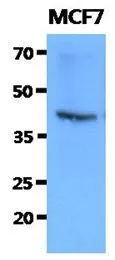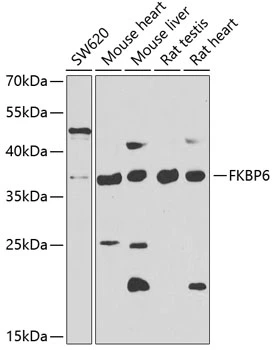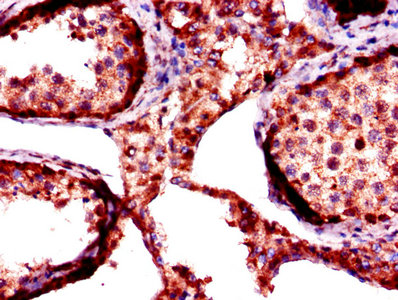
WB analysis of MCF7 lysate (40ug) using FKBP6 antibody at a dilution of 1:1,000.
FKBP6 antibody [AT9B7]
GTX53716
ApplicationsWestern Blot, ELISA
Product group Antibodies
ReactivityHuman
TargetFKBP6
Overview
- SupplierGeneTex
- Product NameFKBP6 antibody [AT9B7]
- Delivery Days Customer9
- Application Supplier NoteThe antibody has been tested by ELISA, Western blot analysis to assure specificity and reactivity. Since application varies, however, each investigation should be titrated by the reagent to obtain optimal results. Recommended starting dilution is 1:1000.
- ApplicationsWestern Blot, ELISA
- CertificationResearch Use Only
- ClonalityMonoclonal
- Clone IDAT9B7
- Concentration1 mg/ml
- ConjugateUnconjugated
- Gene ID8468
- Target nameFKBP6
- Target descriptionFKBP prolyl isomerase family member 6 (inactive)
- Target synonymsFKBP36, SPGF77, inactive peptidyl-prolyl cis-trans isomerase FKBP6, 36 kDa FKBP, FK506 binding protein 6, 36kDa, FK506-binding protein 6, FKBP prolyl isomerase 6, PPIase FKBP6, immunophilin FKBP36, inactive PPIase FKBP6, peptidyl-prolyl cis-trans isomerase FKBP6, rotamase
- HostMouse
- IsotypeIgG1
- Protein IDO75344
- Protein NameInactive peptidyl-prolyl cis-trans isomerase FKBP6
- Scientific DescriptionThe protein encoded by this gene is a cis-trans peptidyl-prolyl isomerase that may function in immunoregulation and basic cellular processes involving protein folding and trafficking. This gene is located in a chromosomal region that is deleted in Williams-Beuren syndrome. Defects in this gene may cause male infertility. There are multiple pseudogenes for this gene located nearby on chromosome 7. Alternative splicing results in multiple transcript variants. [provided by RefSeq, Jul 2013]
- ReactivityHuman
- Storage Instruction-20°C or -80°C,2°C to 8°C
- UNSPSC12352203




